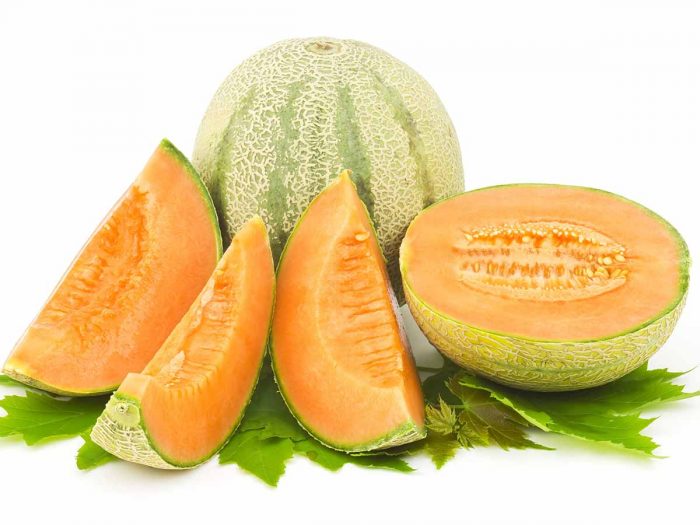We know that cantaloupe is a refreshing treat for humans. But many dog owners wonder – can dogs eat cantaloupe? Packed with nutrients, dietary fiber, and antioxidants, it is important to know what effects it could have if your pooch snags a slice from the picnic table.
Is It Safe for Dogs to Eat Cantaloupe?
Fortunately, for those dog owners out there who also enjoy summertime melons, cantaloupe is completely safe for your dog to eat. Cantaloupe is relatively easy to digest and does have a number of important nutrients, vitamins, and minerals that can benefit your dog. However, cantaloupe is a bit of unusual fruit, since it requires quartering, removing the rind, and sometimes scooping out the core, which is filled with seeds. Following this preparation, however, once the cantaloupe is cubed or sliced, your dog can have a piece or two. [1]
Dogs should get a full and balanced diet from their own food, so there is no need to overdo it when it comes to feeding your dog human food treats. It should be seen as an occasional reward, but not a regular part of their diet, unless a veterinarian specifically gives permission, or if certain specialty foods are being used to treat a medical condition.

Cantaloupe melon makes a refreshing snack in the summer, and it contains nutrients that can benefit a person’s health. Photo Credit: Shutterstock
Is Cantaloupe Good for Dogs?
There are a few potential health benefits if dogs eat cantaloupe, including potential weight loss, vision improvement, immune system protection, and cardiovascular benefits, among others.
Weight Loss
Cantaloupe is a relatively low-calorie snack that is packed with dietary fiber and other important nutrients. For dogs struggling with weight issues, cantaloupe can help them feel full, without adding too many extra calories, while the fiber present in them will help their digestive system. [2]
Improves Vision
Antioxidants present in cantaloupe – namely beta-carotene – have been directly linked to improved vision for dogs. Although dogs already have very good eyesight, as they age, a few extra pieces of cantaloupe can give their eyes a boost. [3]
Boosts Immune System
Dogs have the unique ability to create vitamin C within their bodies, but as dogs get older, this ability weakens, making some dogs deficient in this critical vitamin. Just as in humans, vitamin C is very important to a dog’s immune system, growth, development, and repair processes. A single cup of cantaloupe has nearly 80% of the vitamin C content that a human needs each, so a few cubes for your canine friend will be more than enough! [4]
Protects Heart Health
Studies have found that cantaloupe can help reduce inflammation and protect the heart, both in humans and in dogs! The potassium content can help with the functioning of the heart and circulatory system, while the antioxidants in this fruit will help reduce swelling and joint pain, particularly for highly active or elderly dogs. [5]
Side Effects of Cantaloupe for Dogs
There are some potential side effects if dogs eat cantaloupe, particularly if they eat an excessive amount, these include diarrhea, diabetes, and stomach pain, among others.
Diarrhea
An excessive amount of cantaloupe can lead to diarrhea in your pup since the fiber can work as a laxative. Limiting your dog’s intake will help to avoid this unpleasant mess.
Diabetes
Cantaloupe does contain a high level of sugar, which can be dangerous if your dog is at high risk or already has diabetes. Again, limiting the amount is a good way to prevent these problems.
Choking Hazard
Do not let your dog eat the rind of the cantaloupe, as this poses a major choking hazard and can block the digestive system. Be sure to cut up the cantaloupe into small, easily managed chunks, rather than large slices.
